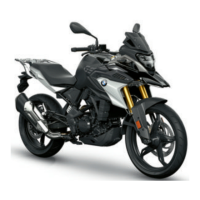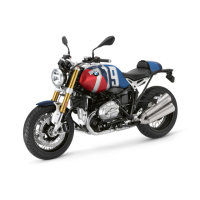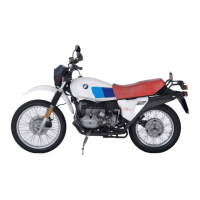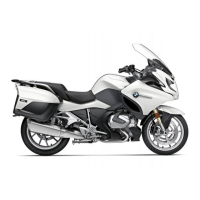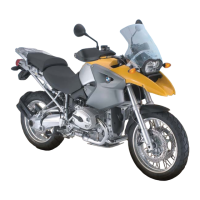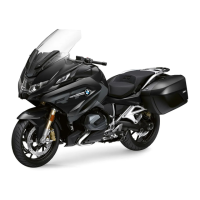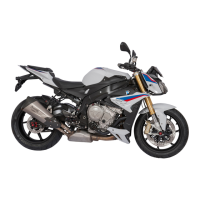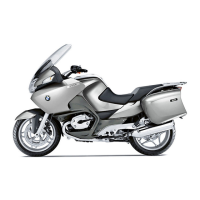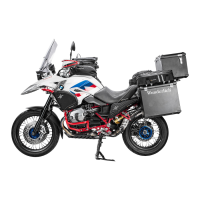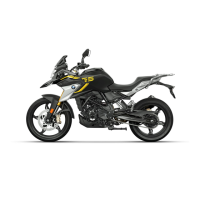
Do you have a question about the BMW Motorrad G 310 GS and is the answer not in the manual?
| Displacement | 313 cc |
|---|---|
| Bore x Stroke | 80 mm x 62.1 mm |
| Compression Ratio | 10.9 : 1 |
| Power | 25 kW (34 hp) at 9, 500 rpm |
| Transmission | 6-speed |
| Final Drive | Chain |
| Front Tire | 110/80 R19 |
| Rear Tire | 150/70 R17 |
| Seat Height | 835 mm |
| Fuel Capacity | 11.5 l |
| Dry Weight | 169.5 kg |
| Wet Weight | 175 kg |
| Wheelbase | 1, 420 mm |
| Engine Type | Single-cylinder, 4-stroke |
| Torque | 28 Nm at 7, 500 rpm |
| Frame | Tubular steel frame |
| Front Suspension | USD fork, 41 mm |
| Rear Suspension | Monoshock |
| Front Brake | Single disc, 300 mm |
| Rear Brake | Single disc, diameter 240 mm, single-piston floating caliper |
| ABS | BMW Motorrad ABS |
Explains common abbreviations and symbols used in the manual for clarity and quick reference.
Details the custom equipment chosen for the BMW Motorrad, including optional equipment and accessories.
Provides general technical specifications and data relevant to the motorcycle's operation and performance.
Guides users on where to find more information, including authorized retailers and the internet.
Explains the function of control units and data storage within the vehicle's electronic system.
Illustrates and labels key components visible from the left side of the motorcycle.
Illustrates and labels key components visible from the right side of the motorcycle.
Identifies components located beneath the motorcycle seat, such as the battery and toolkit.
Details the controls located on the left handlebar for lights, turn signals, and horn.
Details the controls located on the right handlebar, including the emergency-off and starter buttons.
Explains the various indicators, displays, and controls on the motorcycle's instrument panel.
Identifies and explains the function of various warning and indicator lights on the instrument cluster.
Describes the information shown on the multifunction display, including speed, gear, and fuel level.
Details the meaning and presentation of different warning symbols and lights on the vehicle.
Explains how the vehicle indicates upcoming service requirements and maintenance intervals.
Details the fuel reserve indicator and its function when fuel level is low.
Explains the tachometer, including engine speed display and redline warnings.
Covers the operation of the ignition switch, keys, and engaging the steering lock.
Explains the operation of headlights, sidelights, and daytime riding lights.
Details the operation of the turn signal controls for left and right indicators.
Guides on selecting and interpreting information displayed on the multifunction display.
Provides instructions for setting the clock and date on the vehicle's display.
Details the procedure for removing and installing the motorcycle seat.
Instructions on how to adjust the motorcycle mirrors and mirror arms for optimal viewing.
Details on adjusting the headlight for different driving conditions and beam throw.
Explains how to adjust the spring preload for the rear wheel based on load.
Instructions for adjusting the handbrake lever for optimal reach and comfort.
Details on adjusting the clutch lever for optimal reach and engagement.
Essential safety advice for riders, including protective gear and load handling.
Guidance on motorcycle loading, including weight limits and spring preload adjustments.
Discusses factors affecting motorcycle handling at high speeds and potential risks.
Highlights risks associated with exceeding maximum motorcycle or tyre speed ratings.
Warns about the dangers of inhaling toxic exhaust fumes and operating in enclosed spaces.
Provides a checklist for essential pre-ride checks to ensure motorcycle safety and function.
Step-by-step instructions for starting the motorcycle engine and pre-ride checks.
Guidance on the engine running-in period, including speed and RPM recommendations.
Explains how to minimize stopping distance and proper braking techniques.
Instructions on safely parking the motorcycle using the side stand and precautions.
Details on recommended fuel grades, refuelling procedures, and safety precautions.
Provides instructions on how to safely secure the motorcycle for transport.
Directs users to find more information on engineering subjects online.
Explains how the ABS works, its effects on surface irregularities, and rear wheel lift.
Introduces the maintenance chapter and highlights the need for special tools and knowledge.
Lists and describes the tools included in the motorcycle's onboard toolkit.
Instructions on checking and topping up the engine oil level.
Covers checking brake function, pad thickness for front and rear brakes.
Details on checking clutch function and adjusting clutch lever play.
Instructions for checking and topping up the coolant level.
Guidance on checking tyre pressure, tread depth, and wear indicators.
Information on wheel size effects on ABS and procedures for removing/installing wheels.
Instructions for adjusting chain tension, checking wear, and lubricating the chain.
Information on replacing LED light sources and basic lighting system care.
Procedure and precautions for jump-starting the motorcycle's battery.
Maintenance instructions for the battery, including charging and storage.
Details on replacing fuses and the fuse assignment diagram for the vehicle.
Explains how to engage and disengage the diagnostic connector for onboard systems.
Advice on using genuine BMW parts and accessories, and compliance with regulations.
Instructions for operating the heated handlebar grips and their power consumption.
Information on connecting electrical devices to the motorcycle's power socket.
Details on installing, opening, closing, and removing the topcase.
Instructions for installing, opening, closing, and removing the light topcase.
Recommendations for using BMW Motorrad cleaning and care products.
Guidance on washing the motorcycle, including precautions for preventing stains.
Specific instructions for cleaning delicate parts like plastics, trim panels, and windscreens.
Advice on preventing paint damage from environmental factors and proper preservation techniques.
Methods for preserving the paintwork when the vehicle is not in regular use.
Procedure for preparing the motorcycle for extended storage, including cleaning and lubrication.
Steps to take to prepare the motorcycle for use after a period of storage.
Lists common engine starting issues and their corresponding rectification methods.
Provides torque values for critical screw connections on the front and rear wheels and mirrors.
Details fuel grade, capacity, reserve, consumption, and emissions standards.
Specifies engine oil capacity, type, and quantity for topping up.
Lists key engine specifications like displacement, bore, stroke, and nominal capacity.
Provides clutch type and clutch-lever play specifications.
Details the type of transmission and gearbox ratio specifications.
Specifies final drive type, chain deflection, and permissible chain length.
Information on frame type, type plate location, and vehicle identification number position.
Details on front and rear suspension types and spring travel.
Specifications for front and rear brakes, including pad material and disc thickness.
Information on recommended tyre combinations and speed categories.
Lists the fuse assignments for various electrical circuits in the vehicle.
Specifies battery type, voltage, and capacity.
Identifies the manufacturer and designation of the spark plugs.
Details the types of bulbs used for headlights, parking lights, and indicators.
Provides key dimensions of the motorcycle, including length, height, and seat height.
Lists vehicle kerb weight, wheel loads, and permissible gross vehicle weight.
States the motorcycle's top speed.
Provides maximum speed and payload limits for accessory combinations.
Instructions for reporting safety defects to relevant authorities like NHTSA and Transport Canada.
Information about the BMW Motorrad dealership network and authorized service expertise.
Explains the importance of service entries in the electronic service booklet for maintenance proof.
Details on mobility services available to owners in case of breakdowns.
Outlines pre-delivery checks, running-in checks, and standard BMW service intervals.
Presents a schedule of maintenance tasks to be performed at specified intervals.
Lists the standard scope of repair tasks included in BMW Service and confirmation procedures.
A table format for recording performed maintenance and repair work with dates.
